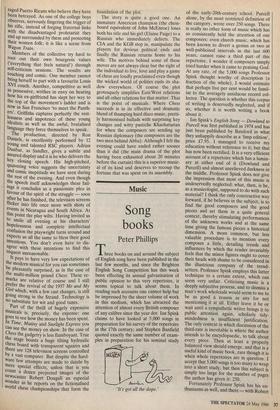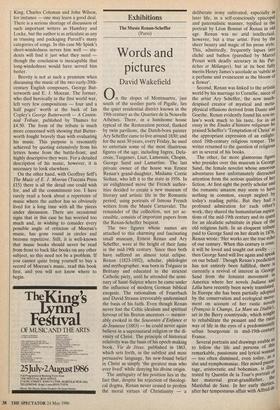Music
Song books
Peter Phillips
Three books on and around the subject of English song have been published in the last few months, and since the Brighton English Song Competition has this week been effecting its annual galvanisation of public opinion to this very repertoire, it seems topical to talk about them. In reading such accounts one cannot help but be impressed by the sheer volume of work in this medium, which has attracted the attention of almost every British composer of any calibre since the year dot. Ian Spink claims to have looked at 5,000 songs in preparation for his survey of the repertoire in the 17th century; and Stephen Banfleld quoted exactly the same number of exam- ples in preparation for his seminal study `It's got all the dope.' of the early-20th-century school. Purcell alone, by the most restricted definition of the category, wrote over 250 songs. There is really no other form of music which has so consistently held the attention of our composers: even church music, which has been known to divert a genius or two at well-publicised intervals in the last 600 years, cannot raise a third part of this repertoire. I wonder if composers simply tried harder when it came to praising God. At any rate, of the 5,000 songs Professor Spink thought worthy of description (a fraction of the whole), I would estimate that perhaps five per cent would be famil- iar to the averagely assiduous record col- lector. The question is whether this corpus of writing is deservedly neglected, and if so, whether it is worth writing a book about it.
Ian Spink's English Song — Dowland to Purcell was first published in 1974 and has just been published by Batsford in what they unhappily describe as a 'limp edition', price £7.95. I managed to receive my education without reference to it; but that has now been rectified. It is a very efficient account of a repertoire which has a lumin- ary at either end of it (Dowland and Purcell) and almost unrelieved darkness in the middle. Professor Spink does not give the impression that most of this music is undeservedly neglected: what, then, is he, as a musicologist, supposed to do with such material? I think the only constructive way forward, if he believes in the subject, is to find the good composers and the good pieces and set them in a quite general context, thereby stimulating performances of the unknown works and at the same time giving the famous pieces a historical dimension. A more common, but less valuable procedure is to mention every composer a little, detailing trends and influences by which the reader invariably feels that the minor figures ought to cover their heads with shame to be considered in the illustrious company of the trend- setters. Professor Spink employs this latter technique to a certain extent, which can seem very unfair. Criticising music is a deeply subjective process, and to dismiss a man's work wholesale would seem to me to be as good a reason as any for not mentioning it at all. Either leave it be or wait until a sympathetic writer brings it to public attention again, scholarly tidy- mindedness is insufficient justification. The only context in which discussion of the third-rate is inevitable is where the author intends to be encyclopaedic, to talk about every piece. Then at least a properly balanced view should emerge, and that is a useful kind of music book, rare though it is when whole repertoires are in question. I accept that 5,000 songs is too many to wrap into a short study, but then this subject is simply too large for the number of pages the author has given it: 250.
Fortunately Professor Spink has his en- thusiasms as well, and there — with Robert King, Charles Coleman and John Wilson, for instance — one may learn a good deal. There is a serious shortage of discussion of such important writers as Humfrey and Locke, but the author is as articulate as any in trussing and packaging Purcell's many categories of songs. In this case Mr Spink's short-windedness serves him well — stu- dents will find it just what they need though the conclusion is inescapable that long-windedness would have served him better.
Brevity is not at such a premium when discussing the music of the two early-20th- century English composers, George But- terworth and E. J. Moeran. The former, who died heroically in the first world war, left very few compositions — four and a half pages' worth at the back of Ian Copley's George Butterworth — A Centen- nial Tribute, published by Thames for £4.50. The form of the tribute is much more concerned with showing that Butter- worth fought bravely than with evaluating his music. This purpose is resonantly achieved by quoting extensively from his letters home from the battle-front, and highly descriptive they were. For a detailed description of his music, however, it is necessary to look elsewhere.
On the other hand, with Geoffrey Self's The Music of E. J. Moeran (Toccata Press £15) there is all the detail one could wish for, and all the commitment too. I have rarely read a book about a repertoire of music where the author has so obviously lived for a long time with all the pieces under discussion. There are occasional signs that in this case he has worried too much and, in wishing to consider every possible angle of criticism of Moeran's music, has gone round in circles and become repetitive. Still, it is well-known that music books should never be read from front to back like books on any other subject, so this need not be a problem. If you cannot quite bring yourself to buy a record of Moeran's music, read this book first, and you will not know where to begin.















































 Previous page
Previous page